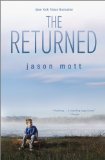Summary | Excerpt | Reviews | Beyond the Book | Read-Alikes | Genres & Themes | Author Bio

This article relates to The Returned
In 2011 archeologists uncovered Neanderthal skeletons, dating back about 50,000 years, that appear to have been intentionally buried with the arms folded so the hands are close to the head. This evidence, which shows respect for the dead, has led some to extrapolate that the Neanderthals had a sense of an afterlife. Scientifically speaking, however, it is a stretch to make the case based on just this one piece of data. What we do know is that the early agricultural societies that started to develop from 10,000 BC tended to have organized religions, and around 2500 BC the Egyptians believed in an afterlife, but only for the Pharaoh. Within a couple of centuries the Egyptian nobels were included in the afterlife, and by 2100 BC belief in the possibility of an afterlife was extended to all Egyptian people.
Religions were developed in part to help adherents develop answers to the question about the afterlife within the bounds of their faith. Currently the world's major religions each teach that there is some form of life after death. Below is a very simplistic view of each; please bear in mind that each religion has developed very detailed and varied texts to expand on their view of the concept of the afterlife and those nuanced opinions are not included here.
Christians generally believe that places exist for the soul once it leaves the body, although they sometimes disagree about how many places there are and how one reaches them. Official Roman Catholic teaching, for example, is that immediately after death a preliminary judgment ("particular judgment") occurs during which the soul is sent to heaven (paradise), hell (torment) or purgatory (a temporary location in which souls are purified so they can obtain the perfection necessary to enter heaven) until the final judgment day. Most Protestant denominations believe similarly – that one is immediately transported into God's presence for judgment – with the exception that most do not believe in purgatory. However, some assert that those who die will simply sleep until the Second Coming of Christ, at which point their eternal fate will be determined.
Judaism's teachings on the afterlife are harder to codify. While most adherents believe that there is indeed life after death, the Torah is surprisingly silent on the matter, concentrating more on one's actions in the current world. Various teachings have arisen over the centuries, but opinions vary widely and there is no set doctrine about what happens to a Jew after he or she dies.
Muslims also believe that a Day of Judgment will come at which time God will decide the fate of each person's spirit according to his or her actions during their earthly existence, with all humanity destined for either Paradise or Hell. A person's final destination is determined by the balance of good to bad deeds performed during the course of their life. When a person dies, they remain in their graves awaiting resurrection. They immediately begin to sense, though, where their destiny lies; those who have done evil will suffer in their graves while those bound for Paradise will be at peace.
In contrast to Christianity and Islam, most Hindus don't believe in a heaven or hell. Instead, they believe that while one's body dies, one's soul continues on, being reborn in another body after the old one ceases to exist. This continuous cycle of life, death and reincarnation is only broken when a soul no longer suffers from the impurities of attachment, delusion and karma, and thereby achieves union with God Almighty. An individual's next life – whether he or she returns as a higher being or a lower one – depends on their deeds, state of mind at the time of death, the time of death, the activities of their children, and the grace of God.
Most Buddhists believe in rebirth while rejecting the existence of a soul, maintaining that there is no existence of an independent self that is apart from the rest of the universe. Rebirth is not the same as reincarnation; the latter is the belief that the soul enters a new physical body, while Buddhists instead believe that it is the energy created by life that continues on in a new form. Rebirth occurs in one of five "realms" (or six, depending on the school of thought): Devas; Asura, Hungry Ghosts, Hell, Animal, and Human. These realms are further divided into 31 separate plains of existence. Nirvana – freedom from rebirth – is achieved when a being is completely purified of desire, aversion and ignorance.
Filed under Cultural Curiosities
![]() This "beyond the book article" relates to The Returned. It originally ran in September 2013 and has been updated for the
March 2014 paperback edition.
Go to magazine.
This "beyond the book article" relates to The Returned. It originally ran in September 2013 and has been updated for the
March 2014 paperback edition.
Go to magazine.
Only when we are no longer afraid do we begin to live
Click Here to find out who said this, as well as discovering other famous literary quotes!
Your guide toexceptional books
BookBrowse seeks out and recommends the best in contemporary fiction and nonfiction—books that not only engage and entertain but also deepen our understanding of ourselves and the world around us.